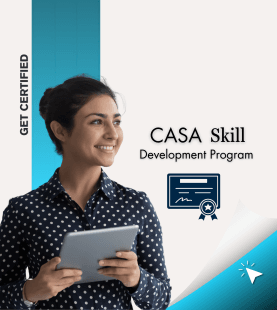PGP in Digital Marketing
- Digital Marketing Courses
- 834 (Registered)

Digital marketing is the face of modern-day business. Enterprises with no digital presence are equivalent to non-existent. The rise of the internet and its rapid integration has created unprecedented opportunities for businesses to thrive, compete and sustain in today’s technologically intensive era. With businesses increasingly adapting to the digital age and competitively capitalizing on the digital marketing platform, the scenario calls for skilled professionals who can aid in harnessing digital power. The future marketplace presents a promising place for those who can captivate and influence digital platform users with their skills and insights.
Live Online Training
Industrial Projects, Internship
Globally Renowned Trainers
Hands on Training Experience
Placement Assistance
24/7 Assistance
Multiple Simulation Exams
Course Completion Certificate
Program Overview
India has witnessed a remarkable rise in digital marketing boosted by the media boom, digital device proliferation and usage, and increased access to the internet. With over 900 million internet users, India tops the global rank of the largest online market. With over 5.15 billion USD as the market size in 2023 alone, the country's digital landscape has certainly evolved. The year 2024-2032 is projected to witness a market growth in digital marketing of 30.2% amounting to a value of USD 55.37 billion. This data signifies the growing relevance and significance of the industry in the country. At the global level, the digital marketing market size soared to USD 363.05 billion in 2023.
The whopping market size of the digital marketing industry is reflective of how businesses are fiercely leveraging the advantages of technology, particularly the internet and digital devices to generate growth. While disruptive technological growth brings tremendous opportunities for businesses to capitalize on, it also opens tremendous career opportunities for individuals enticed by booming industry. For businesses to leverage Digital Marketing strategies, skilled labour is a necessity. The field requires technical skills such as Data Analytics, SEO, Marketing Automation, Content and Video production, Design Fundamentals, etc. among many others. The successful implementation of digital marketing strategies demands skilful implementation and expertise strategies. This is where a structured and well-formulated professional training like a Postgraduate program in Digital Marketing comes into play.
The PGP in Digital Marketing at Skillschool offers comprehensive skill development and a well-rounded understanding of the ever-booming digital marketing landscape. The program is meticulously designed and geared towards graduates aimed at equipping them with the intrinsic and nuanced understanding of the diverse digital platforms that are key in the digital marketing field. At Skillschool, learners will engage in experiential practical-based learning through real-world projects and case studies to enhance their skills and knowledge.
We are further empowered by our team of highly-trained and experienced faculty, to achieve our goal of imparting world-class training across the country through our online PGP in Digital Marketing. Our mentors/instructors have decades of experience and have records of having played major roles in the digital marketing industry directly or indirectly. Our instructors integrate the industry's latest trends in their teaching methodologies. Besides routined sessions, learners are free to connect with the instructors for assistance in the course. They are committed to offering intensive and personalized learning to each of the learners.
Join Skillschool for a thriving career preparation in the most in-demand profession today. Engage in a 9-month career transformation prep.
Course Content
Post Graduate Program in Digital Marketing Curriculum
Module 1- Overview of Digital Marketing
The module aims to give a sound introduction and a strong foundational grounding of the Digital Marketing industry. The chapter will cover topics, including the Meaning of Digital Marketing, relevance, importance and preference, processes involved in digital marketing, brand visibility, core concepts like niche targetted traffic concepts, lead generation and strategies, Traffic conversions to leads and sales, engagements, etc.
Module 2- Website Creation
This module is the exploration of the processes and practices fundamental to web creation. Students will learn the diverse techniques and methods of web creation. The topics are Website planning, web page and content creation (WordPress), registering domain and web hosting, Website Blueprint creation, Plugin and theme integration, Engagement options, Mapping domain names to web Servers, and the significance of Responsive.
Module 3- Search Engine Optimization
This module covers the fundamentals of SEO and introduces learners to the divergent practices involved in search engine optimization. The core areas of this module are:
i) Introduction to SEO: Overview of SERP, types of search engines, Search engine working methods, importance of SEO.
ii) Domain Registration: Domain for SEO standards, Hosting Space top servers, Domain Mapping, tools for identifying expired domains.
iii) Introduction to Google Algorithms and latest trends and updates: Google algorithm working mechanisms, Panda/Penguin/Hummin bird: methods of working, latest updates and Fixing methods.
iv) On-Page Optimization: This section will cover- optimizing web pages, keyword planning and website structure. The topics include blogs, contents & their importance, Sitemaps creation and integration, Google analytics, Webmaster integration, Website structure, URL structures, Static and Dynamic Web Optimization, Meta Key Description, SEO & Keywords, Niche targeted keyword research, Competitor Analysis tools, keyword research tools, Title tag, fixing right keyword, etc.
v) Off-page Optimization: Overview of Off-page optimization, Domain and Page authority importance, Trust and Flow Citation, Strategies of optimizing domain authority, Backlinks types, Link building, types, do’s & dont’s & its importance, strategies, etc.
vi) Local SEO: The section includes local business listing, ranking improvement methods, and Google Places optimization.
vi) SEO Reports: Tools list, On-page and Off-page audit report, and monitoring SEO process.
Module 4- Search Engine Marketing
This module aims to impart the techniques involved in SEM starting from introducing students to the fundamental understanding of the various techniques to theri advanced method integration. The module comprises varied subsections each giving an in-depth study into the diverse techniques.
i) Pay Per Click: Overview of PPC, Advantages, Entities involved, PPC Ad BluePrint, Creating Compelling PPC Ad and theri properties, and General formula for PPC calculations.
ii) Landing Pages: Overview of landing pages, types and creation of niche-targeted landing pages.
iii) Quality Score: Defining quality score and its importance, ranking of quality score, CTR and user ranking of Ads by Google, Top Three Positions in Google AdWords: Yellow/Pink, Fetching Keywords Quality score, Safeguarding methods for High-quality score, Guideline for landing page quality score.
iv) Adword Billing Account and Campaign Structure: This section delves into the steps and procedures of Adwords billing account and Campaigning structure. Topics include Account building, Budget types: Prepay & Post-pay, billing methods, Monthly invoicing, and keyword grouping. Students will also explore the various AdWords tools like Keyword tool, IP Exclusion, Search Insights, Traffic Estimator, and Ads Diagnostics Tool. The section also explores the Google AdWords universe including Google Search Partners, Google Display Network, Google Apps Network, Google product, and Mobile Ad Network. Settings in the Google Search Adwords section explore the varied aspects including location and languages, Network and devices, Bidding and Budget, delivery method, AD extensions, Location extension, call extension, Advanced settings, Ad delivery- rotation & frequency capping. In the AdWords Search Campaign section students will explore language, networks, Bidding and budget, Ad extensions, and Advanced settings. The keywords Section covers Broad Match keywords and Modifier, Phrase Match, Exact Match, Keyword research, Negative keywords, and how negative keywords work, Sculpt campaigns with Negative keywords, creating a great negative keywords list, adding negative keywords.
Google AdWords campaign tracking section covers Conversion tracking, Linking with Google Analytics, Importing goals from Google Analytics, and AdWords search Funnel. The Bid management section covers setting the right bid the first time, AdWords Auction, shaping daily budget, Campaign small tricks, and Ad Group level vs. Keyword level Bid management.
The module also explores Landing Pages – Google AdWords Extension where students will learn Testing of current landing pages, Initiating successful Ads and their wording, general landing page advice and remembering Quality Scores. Optimizing AdWords campaign: This section includes A/B Test, Time required, Ad Optimization, Bid Management, Keyword list escalation, and Negative keywords. Quality score Optimization and conversion tracking importance.
AdWords Interface: This covers Networks, AD Extensions, Dimensions, Metrics requirements, Features etc
Students will also be introduced to the AdWords Editor and its importance in digital marketing. They will also understand how to handle My Client Centre (MCC) accounts in Google AdWords and the process of getting an MCC Account.
Module 5- Social Media Marketing
This module explores the intricate methods of using social media in digital marketing. The chapter begins with an introductory overview of SMM, promotion type and importance of landing pages and the tools necessary for social media marketing. The module explores the diverse social media marketing techniques across varied platforms.
Facebook Marketing (B2B and B2C Promotion): This section of the module covers Facebook advertising, evaluating competitive Facebook ads, working on the power editor tool, creating Facebook Ads and Ads reports, creating Instagram Ads using Facebook Ads, studying and Improving Instagram Ads
LinkedIn Marketing (B2B Promotions): This section delves into the techniques of building ads on LinkedIn. It starts with an introduction to LinkedIn Ads and delves into the Competitive analysis of LinkedIn Ads, Crafting LinkedIn Ads and creating Analysis reports.
Twitter Marketing: This section explores the techniques involved in using Twitter for marketing by building Twitter Ads Campaign for Business and learning the techniques of analysis reports.
Module 6- Online Display Marketing
The module covers the introduction of Display Ads, their importance and types. Topics also include Display vs Contextual Ads, Display Ad Networks and working with them, Tracking and Measuring ROI ( Return on Investment), Generating reports, Multiple Ad formats, targeting criteria and remarketing, techniques of adverse video on YouTube using AdWords, and adverse on the display network using mobile devices and platform.
Module 7- Email Marketing
This module unfolds the applicability and use cases of Email marketing. The chapter will be diversified across multiple sections covering uses of Email marketing, Types, methods and Tips for setting up email campaigns.
The first section explores the use and objectives of Email Marketing. Topics include Email Marketing Blueprint, Reasons for choosing Email marketing, the Importance of the Ads industry, and the difference between Email marketing and Advertising.
The second section explores the variants of email marketing and includes topics such as Opt-in email, Double-Opt in, Email campaign setups, Broadcast email, and Auto Responder email.
The third section of the module explores the methods of setting up Email campaigns. Students will learn the methods of creating landing pages, designing and constructing email campaigns, completing, testing and sending, creating bulk emailing campaigns, and advanced tracking segments. The module will conclude with a section that explores tips for Email campaigns. The topics include Spam Violates, CAN-SPAM compliance guidelines, tips for sending emails to inboxes directly instead of spam folders, top softwares list for email marketing, and implementing A/B testing for increasing return on investment (ROI).
Module 8- Online Reputation Management
This Module introduces students to ORM beginning with an overview of ORM, its importance and its core concepts. Students will learn how to deal with criticism online. The chapter also explores the top ORM commandments, methods of creating a positive brand image online, ORM monitoring tools and top examples.
Module 9- Google Analytics
The module is designed to give a comprehensive understanding of Google Analytics. It delves into the mechanism of Google analytics, structure summary, analytics insights significance, prominence of cookie tracking, Cookie usage on Websites, Account Setup, analytics code addition in a website, goals and conversions status, methods of setting up goals conversion, Importance of Bounce rate and Exit rate, Vitality of Funnels, Funnel Set up in goals, AdWords and Analytics account integration, Google analytics marketing strategy, Tag Manager Outline, Link Tagging setup, Filters and Segments significance, Monitoring traffic sources and behaviour, Web Analytics Reports.
Module 10- Mobile Marketing
This module familiarizes students with the fundamentals of Mobile Apps and the basic concepts of launching Apps. In the first section, students will learn Mobile App fundamentals that introduce the usage of mobile apps for business, the development of Platform Apps, and types of app stores. Students will also learn the techniques of launching apps like Pro by exploring how to launch apps and the pros and cons involved. The next section delves into the Techniques of Making Money from App. Here, students will learn about Free vs Paid Installs and Strategies for Making Money from the App. The module also introduces the concept and practice of App Store Optimization, keyword research and Competitive Analysis.
The module will also train you about the ways to promote and market your app, methods of increasing positive app signals, Strategies for reviews for higher ranking, and regular enhancement of App downloads. The chapter concludes with the Apps Tools section wherein students will explore App Analysis tools and App keyword research tools.
Module 11- Affiliate Marketing
This chapter is all about Affiliate Marketing and the techniques of producing and converting leads. The module will cover topics including:
- Models of Affiliate Marketing
- Affiliate Marketing strategies and secrets
- Inaugurate as an Affiliate
- Making Money in Affiliate Marketing
- Top Affiliated Networks
- Ways of getting accepted as an affiliate by the top Affiliate networks
Module 12- Content Marketing
This module is a vast section covering the Content writing process, tools, content writing the internet and various career opportunities. The section will cover the following topics:
- Worldwide Web from the Content Writing Perspective
- Social Media from the Content Writing Perspective
- Mobile User’s Perspective of the Internet
- Content writing business aspect ( Facebook -Meta, LinkedIn, Twitter, Scribed, Stumbleupon, Medium)
- Content Writing Processes and Types
- Content writing tools
- Content delivery formats
- Content marketing
- Future of Content Writing
- Online content selling
- Content writing as a secondary source of Income
- Plagiarism
- Content protection
- Tags, Hash Tags, keywords
- Content production in other forms- Video, audio, text
- Content Attributes
- Infographic
- Introduction to IT technologies and their effect on Content writing
- Introduction to CMS
- Free and Paid Tools
- Search Engines and their working mechanism
- Search Engine Optimization
- Links to useful websites and blogs
- Legal Implications
- Key Features
- Requirements
- Target Audiences
Intensive live online program
A completely online-taught program available for easy access from anywhere.
Intensive 9 months of Training in Digital Marketing
The program lasts 9 months delivering intensive training through a comprehensive curriculum.
Learning with Experience
Multiple simulation tests and practical projects offer a hands-on experiential learning experience.
Certified Trainer
Get specialized training under the mentorship of expert industry-based trainers with years of experience and Industry Insights.
Building Top Skills
Develop growth marketing tactics by exploring core skills and tools.
24 x 7 Student Support
Avail comprehensive student support and personalized mentorship available at students disposal round-the-clock.
Be Industry-Ready
Build practical competencies, attain industry insights, gain exposure to real-world case studies and become capable of embarking on your Digital Marketing career.
Industry-Graded Certification
Develop critical skills and get rewarded with industry-relevant credentials upon completion of the program.
The PGP in Digital Marketing can be pursued by fresh graduates (bachelor’s Degree from any field ) and Working Professionals with a minimum of 0-3 years of experience in the Digital Marketing Industry.
The PGP in Digital Marketing Program is designed to impart top skills that are currently in massive demand across the digital marketing field. We open the program to every interested individual who wishes to embark on a Digital Marketing career or professionals seeking to climb their career ladder.
Program Outcomes
- Students will be adept at the latest approaches and techniques of strategic marketing impactful across all channels.
- Develop competency across diverse segments and tools in Digital Marketing like SEO, SEM, Google AdWords, Google Analytics, and Social Media Ads (FB, YouTube, Ads, etc)
- Be capable of managing a personal digital brand or becoming an affiliate marketer or Influencer.
- Be adept at optimizing and creating marketing for effective revenue generation.
- Capable of employing content across platforms as a tool for communicating the brand's message and value.
- Attain comprehensive knowledge of top-tier digital marketing functions including Web analytics, SMM, Paid Market and Inbound Marketing.
- Have the potential to plan, manage and execute integrated multi-channel campaigns.
- Capable of leading teams, initiatives and Campaigns.
- Efficiently knowledgeable about the diverse digital marketing disciplines, their functions together and optimizing the use of each verticle.
Program FAQS
Skillschool has taken meticulous care in developing the PGP in Digital Marketing in collaboration with industry experts. The curriculum is designed in a manner that a fresh beginner will also be able to follow through with ease. In addition to the top-class trainers, the curriculum also features industry’s latest trends and technologies to ensure our program gives students futuristic skills development.
Students will be required to carry out practical projects in real-world cases as part of the PGP in Digital Marketing program. Students will have the opportunity to work on projects across the fields of Banking, Networking, Sales, E-commerce, Marketing, Hi-tech IT, etc.
The Skillschool PGP in Digital Marketing will run for 9 months engaging students in an interactive and immersive learning experience.










